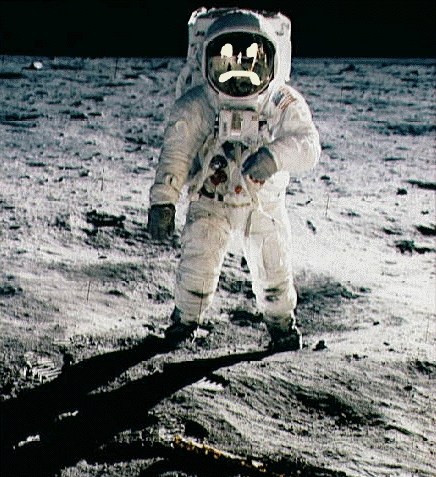During our repeated trips out to the Kennedy Space Center, there was a palpable feeling of gloom among “the regulars” that we met, including the KSC employees, the locals, the shuttle-watching veterans. On top of the scheduled end of the Space Shuttle program, which was sure to devastate tourism in and around Cape Canaveral, President Obama had announced (mere days before) a total sea change in the budget and direction for NASA. The regulars were not happy about it.
Why all the sad? Click to read more.
First, a bit of background.
What’s so wrong with the space shuttle? It’s awesome!
Weeeeell, the sad thing is, it’s kind of not awesome. 🙁
The shuttle concept dates back to the 50s, actually, and when you think about the future as it was pictured then—flying cars, helper robots, and giant space stations—it made perfect sense that we wouldn’t want single-use disposable spacecraft. Heck, it even makes sense now; we’re recycling! Apollo was supremely wasteful from this perspective; out of the whole explodable skyscraper that lifted off, the tiny capsule on top is the only thing that came back to earth in working order, and even that just got stuck in a museum. We gotta recycle, baby!
This was also seen as a way to make space travel much cheaper, and early projections for the savings to be had with a reusable spaceship were pretty rosy. But the shuttle design came in 20% over its estimated weight, the flights remained expensive, and after the changes from the Challenger accident, the maximum payload it could carry actually dropped.
On top of that, the design was kinda flawed from the get-go. Both the Challenger and Columbia disasters, in their own way, were direct results of the shuttle being built to ride alongside the fuel tanks and booster rockets, instead of on top of them. It also didn’t have any proper emergency rescue systems; heck, the astronauts inside weren’t even provided proper spacesuits in case of pressure loss. (Here’s a shocker: if the damage to Columbia’s wing had been discovered while it was in orbit, they still might not have been able to do anything about it.)
So, shortly after Columbia went down over Texas, NASA realized it needed a fresh start.
What was NASA working on?
In the concourse at the Space Center was a basic, but full-sized, mockup of the shuttle’s successor: the Orion capsule.
It was instinctively a bit of a letdown to see NASA regressing from an awesome plane-looking thing to what basically amounted to a Route 44-sized Apollo capsule. But really, NASA was going back to what had worked for the whole manned space program leading up until the shuttle: a small-ish crew compartment that lifted off the top of a rocket and splashed back down in the ocean. Just like old times! And traditional rockets had already proven to be the workhorses for moving cargo and satellites into space, so this was a logical move.
Plus, don’t sell Orion short: it carries up to six astronauts at a time, it can launch with no astronauts to deliver cargo, and one other thing:

So Orion is great! It’s the next logical step in space exploration! We can built it! We have the technology!
Yeah, But…
Why’s there always gotta be a “Yeah, but,” man? Can’t awesome things just be awesome and stay awesome?
So. Back in 2006, NASA started this program called Commercial Orbital Transportation Services. It’s a pretty crazy idea: pay private companies, not NASA, to ferry people and stuff to and from the International Space Station. The notion is the same as any privatization: save money. More significantly, that kinda makes the Orion redundant for that particular purpose.

Plus the whole Orion project is way over-budget, and likely to become more so before it’s done. Says the Government Accountability Office (thanks Wikipedia):
NASA’s current acquisition strategy for the CEV [that’s the Orion] places the project at risk of significant cost overruns, schedule delays, and performance shortfalls because it commits the government to a long-term product development effort before establishing a sound business case.
Well, crap, but we already spent all this money on it! So either we waste money by cancelling the program, or waste money by moving forward with it.

In truth, it was honestly very frustrating to see all the work being done on Orion—including Ares, the rocket it’s supposed to fly on that had already conducted a test launch—and think of it simply being canned. It was like a much cooler Superconducting Super Collider, all over again.

The ball is in Obama (and Congress’s) court: keep working on all this coolness, or take a different direction entirely. What will Obama decide? Find out on the next Intermittent Kevin!

